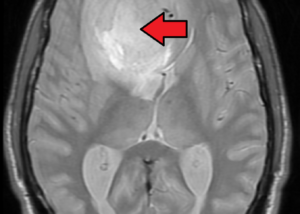
If you’re been suffering from blackouts, headaches and hearing your heartbeat in your ear, this could mean a serious brain condition.
In fact, just one of these symptoms can be caused by something serious affecting your brain.
“If you have headaches that won’t go away, you should seek medical attention,” says Kaushal M. Kulkarni, MD, board certified ophthalmologist and neuro-ophthalmologist in private practice in New York.
“And especially if the headaches are associated with temporary blackouts or dimming of your vision (for example when you change head position or get up too quickly), or if you can hear your heartbeat in your ear (pulsatile tinnitus), this could be a sign of high pressure in the brain,” explains Dr. Kulkarni.
Can Be a Brain Tumor or a Blood Clot
“This can be a serious life-threatening or vision threatening condition,” continues Dr. Kulkarni.
“You will likely need an MRI to check for a brain tumor or blood clot, and sometimes a spinal tap to check for infections and inflammation, and to check your spinal fluid pressure.
“You will also need an eye exam to check for swelling of the optic nerve due to high pressure (papilledema).
“Even if there is no brain tumor, blood clot or infection, women in their childbearing years can have hormonal changes that lead to high spinal fluid pressure, causing headaches, vision loss or a pulsating noise in the ears.
“This is sometimes referred to as pseudotumor cerebri or idiopathic intracranial hypertension.
“The condition can affect men as well, although less often. This can also happen with weight gain, birth control pills, acne medications or some antibiotics such as tetracycline, doxycycline or minocycline.”
The only way to know that there is no brain tumor or blood clot causing the vision blackouts, headaches and heartbeat in the ear is to undergo an MRI.
That means, for some individuals, working up the nerve to lie partially inside a small enclosure. If an MRI is recommended, agree to this.
It’s the only way to know for sure whether or not something within your brain is causing the symptoms.
Dr. Kulkarni also explains, “Because the symptoms can sometimes come on slowly, and tend to affect the peripheral vision first, and because the condition often affects younger women and men who are leading busy lives, it is common for the condition to go undiagnosed until it is too late.
“Therefore, if you have any of the symptoms we talked about above, you should seek medical attention.
“And it is important to have an eye exam to check for optic nerve swelling, as this is sometimes the only indicator of high pressure in the brain.”
 Dr. Kulkarni specializes in providing refined medical and surgical eye care, and has a special interest in optic nerve regeneration. He completed subspecialty training in neuro-ophthalmology at the prestigious Bascom Palmer Eye Institute in Miami, FL.
Dr. Kulkarni specializes in providing refined medical and surgical eye care, and has a special interest in optic nerve regeneration. He completed subspecialty training in neuro-ophthalmology at the prestigious Bascom Palmer Eye Institute in Miami, FL.
 Lorra Garrick has been covering medical, fitness and cybersecurity topics for many years, having written thousands of articles for print magazines and websites, including as a ghostwriter. She’s also a former ACE-certified personal trainer.
Lorra Garrick has been covering medical, fitness and cybersecurity topics for many years, having written thousands of articles for print magazines and websites, including as a ghostwriter. She’s also a former ACE-certified personal trainer.
.


























